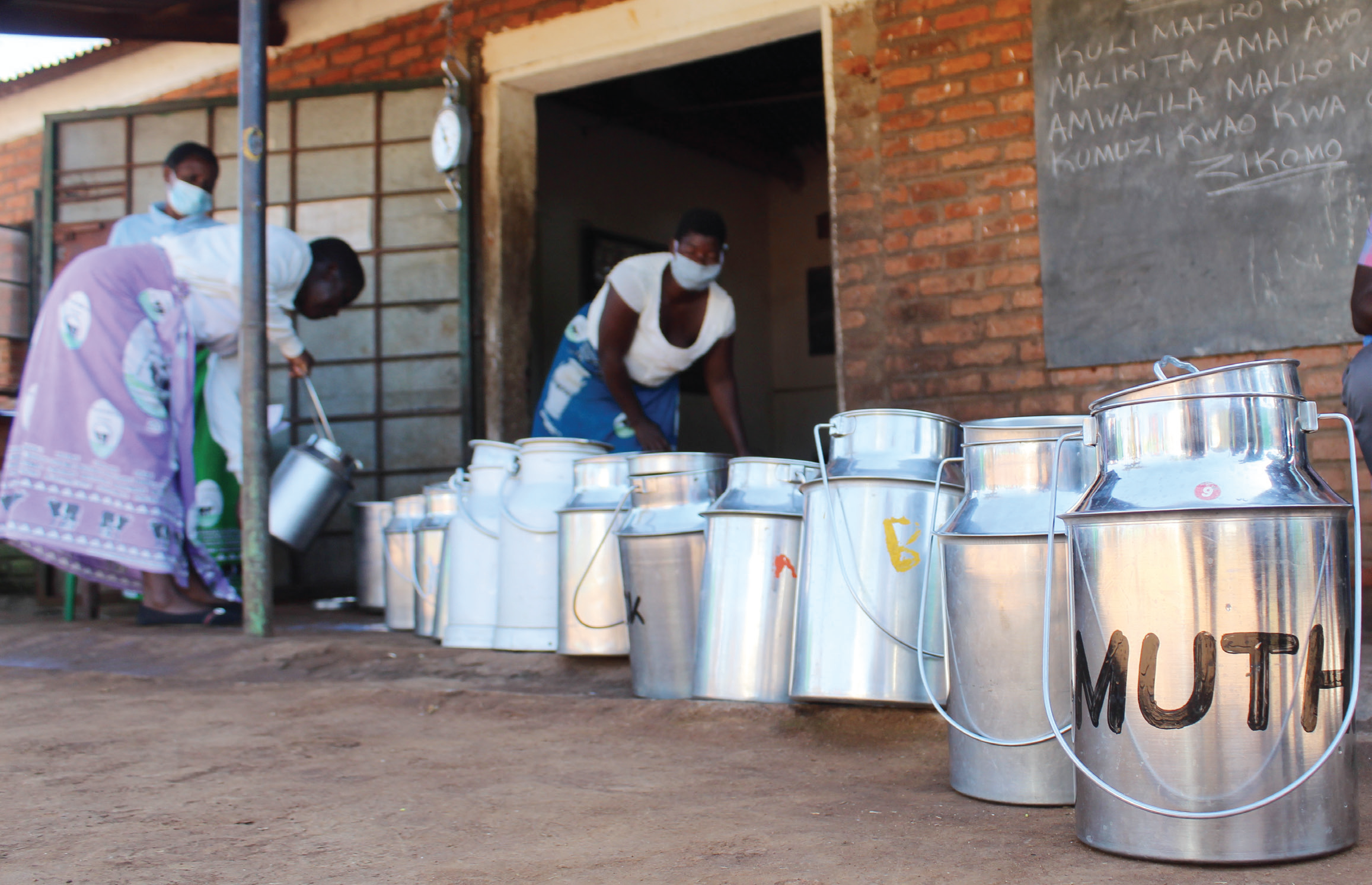Agcom boosts milk business
United dairy farmers in Malawi are determined to cash in on nutritionists’ worries that Malawians are not taking enough milk to stay healthy.
The Shire Highlands Milk Producers Association (Shmpa)—with 12 000 members, comprises 33 bulking groups in Mulanje, Thyolo, Chiradzulu, Zomba and Blantyre.

“The 21 active groups in these five districts demonstrate why we need not thirst for milk because dairy farming is big business,” says Zione Chiphika, the project officer for the agribusiness group comprising 5 700 women.
Shmpa’s cooling facilities receive milk from farmers for sale to Lilongwe Dairy, Capital Dairy, Universal Dairy and Blantyre Dairy.
In 2020, the association won a K1.2 billion matching grant from Agcom, the government-run Agriculture Commercialisation project funded by a loan from the World Bank. The Ministry of Agriculture envisages the matching grants transforming agriculture from a seasonal hand-to-mouth activity to life-changing business for job creation and national development.
After signing the dotted lines, Agcom will release K823 million in three installments to Shmpa, with the group contributing the remaining 30 percent in cash, labour, building materials and other locally available resources.
“Most of our members are needy women, so Agcom is expected to give us 1 000 cows and 300 are already here. The farmers will also receive nutritious cattle feed and the cost will be deducted when the milk is sold,” says Chiphika.
Investing in cattle, feed and milk cooling facilities has steadily raised milk production from 90 000 litres in 2018 to 100 000 in 2019 and 111 000 in 2020.
“Previously, farmers used to endure long walks to fetch animal feed, but milk prices were low. Giving them nutritious animal feed and collective bargaining with a reliable off-taker guarantees us better prices. Even membership is growing,” she says.
Shmpa was founded to uplift vulnerable women, including widows, persons living with HIV and the elderly raising orphans. Over the years, men have joined in to reap the benefits.
“Looking at the benefits women get, many are switching from crop production to dairy farming because land is scarce and barren. So, milk has become a trusted source of income,” Chiphika says.
The group owns some 16 000 cows, about one or two per member. Some 325 calves graze and moo at their Mpemba breeding farm in Blantyre.
The remaining 700 cows procured with support from Agcom comprise disease-resistant cross-breeds from the Malawi zebu with Frisians and Jersey, which produce more milk that the local breed. They will increase the count as well as milk production—a big leap for the 36-year-old association.
Chiphika narrates: “Shimpa started in 1985 when most groups were not existent and buyers were swindling farmers by dictating low milk prices.
“We came together to form a united front so that we can speak with one voice against exploitative tendencies. Today, almost 90 percent of the milk in Malawi comes from Shimpa and the Agcom support will help us grow our business and market share.”
Using the matching grant, the group has bought a 15-tonne truck for delivering cattle feed to farmers. The truck is expected to haul 300 tonnes annually for three years and cashiers deduct K40 per kilogramme from milk sales.
The group has also acquired a one-tonne pick-up for transferring cows and bulls, including the new herd bought from local farmers at about K550 000 each.
“Our members will benefit because each cow produces 12 – 15 litres a day and we buy the milk at K200 per litre,” says Chiphika.
Aged 53, Modesta Bendulo says the commercialisation project has made milk production simple for livestock farmers who bear the brunt of climate change and population pressure
She says: “With shrinking land size per person and frequent drought, we walk long distances to fetch animal feed, especially during the rainy season when hunger leaves people and livestock competing for maize bran.
“During the harvesting season, we barter a litre of milk with five kilogrammes of the bran in grinding mills. This will become history.”
Bendulo is too old to withstand the back-breaking walks, work and jostling, she says. So does Patsireni Mbetwewa, a breadwinner for her three daughters, two sons and three children left behind by her deceased sister. Her husband died from hypertension in 2018.
She narrates: “My husband didn’t leave us with much inheritance. We now rely on two cows that give us 10 litres every day. Every month, I make at least K60 000 from milk sales. This is enough for our basic needs and educational requirements for a child who pays K10 000 every three months at Chambe Community Day Secondary School.”
“Without these cows, life would have been terrible. Mine would be a house of hunger and poverty. Although I am too old to work, my children and I would be spending more time doing piece work in neighbours’ fields while neglecting ours.”
And Chiphika knows why the future could be bright for these milk producers and their families.
She states: “The demand remains high and it will keep growing as the population grows. Lilongwe Dairy alone requires about 100 000 a day, but we can only supply 90 000 because the remainder is shared by the remaining off-takers who need more as well.”





